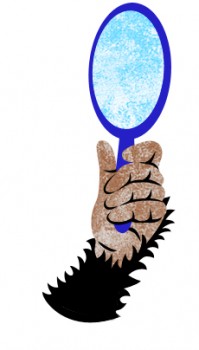The human factor
14 March 2013 | Non-fiction, Tales of a journalist

Illustration: Joonas väänänen
Columnist Jyrki Lehtola zooms in on the worst factor in the diminishing quality journalism: us. Our voice is now dominant in the media, and it isn’t a particularly pleasant one.
Have you heard the rumours about the crisis in the media yet? Or their search for a new revenue logic that consists of repeating the words ‘Internet’ and ‘money’? I’m sure you have, even though the media itself claims to be getting along fairly well and can always find some perspective on its dropping circulation numbers that tells everyone they’re doing just fine. (For example, their numbers are better than in 1898 when the paper didn’t exist. Yes, we rule!)
But that isn’t the only problem. The other problem exists in us, the readers, listeners and viewers. Social media, discussion boards, and the media itself have given us a voice, and, er, well, it isn’t the kind of voice anyone wants to hear.
It turned out we have an ugly voice, and we want all the wrong things.
The media has a strong self-image as an educational institution based on its historical role in society. It not only tells what happened, but also what it might mean, what caused it, and what it could lead to.
So what? Not interested. Don’t care. Now that we have a voice, now that the media wants so desperately to know what we want, so we’ll want the media, we have a voice they have to listen to.
And with that voice we are telling them that, sorry, we don’t want their brand of enlightenment. We want entertainment. If there is any way you can adapt a news story so it involves either half-naked women or people we know vaguely from TV, by all means please do so. Otherwise we aren’t interested
‘Unemployment growing?’ Sorry, not click-worthy. ‘Unemployment growing. Famous TV actor says he was once out of a job.’ For real? That I have to read, that has a human angle!
And so the media’s websites attempt to entertain us ever more frenetically. Real news stories are just an obligatory part of the page layout, but the greatest click-through expectations are focused on the small news items with something funny, cute, or revealing about a dog, a celebrity or women’s breasts.
And even that isn’t enough. That we could live with – the fact that we’re only interested in entertainment – but then there is the other side of the coin that no one ever really wants to talk about.
In a nutshell, we’re spineless, aggressive idiots.
In the old days, before the Internet, the voice of the people was only really audible on the opinion pages. There the voice of the people was selected from a larger sample, edited and given civilised headlines.
The opinion pages still exist, but in an increasingly lonely world of experts writing dull platitudes to each other. The audience’s opinion, what the people think, that’s on Facebook, Twitter and the discussion boards of newspapers and special interest groups.
And this voice of ours, well, it’s quite ugly.
Here someone goes again arguing against gay marriage and homosexuality using an argument you aren’t supposed to acknowledge, but someone replies anyway and the whole discussion turns into a shouting match, accusations, and ad hominem attacks with all the hallmarks of libel.
Another commenter thinks the man in a tiny piece of news who crashed his Toyota got exactly what he deserved, because what kind of an idiot buys a Toyota?
A surprising number of readers seem to believe that the columnist who wrote the wrong opinion in the newspaper is a useless good-for nothing sissy who’s never had sex in his life and whose children must be ashamed of him. And so on.
There we are. The people, with our voice, and no one likes to listen to it. Unfortunately we, the media, have to pay attention to it if we want the people to pay attention to us.
So we dumb ourselves down, gradually, inexorably. There’s no point in telling them about the long arc of history, humanity’s struggle toward equality or what Althusser thought about free will. They don’t want to know, and they wouldn’t understand anyway.
We hire a woman as a columnist who is known not only for her breasts but also her racism. We reduce the amount of culture, we reduce the amount of education, because the people got a chance to say what they wanted, and we are fulfilling its wishes.
You can see it in reporters now, perhaps even in a healthy way. Before they were arrogant know-it-alls, people for whom journalism had such moral authority that they wrote it with a capital J.
Now they can’t even lie to themselves about their value, so reporters have changed from cynical, arrogant wannabe thinkers into enthusiastic, child-like players, because the number of jobs for reporters is constantly decreasing, and who wouldn’t be willing to do anything in order to hold on to the ones there are?
Translated by Owen Witesman
Tags: internet, journalism, media
No comments for this entry yet
